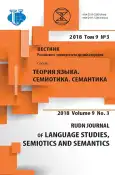ЯЗЫК И КУЛЬТУРА: КОНТЕКСТЫ НА АНГЛИЙСКОМ И ИРАКСКОМ АРАБСКОМ ЯЗЫКАХ
- Авторы: Мухаммед А.А.1
-
Учреждения:
- Открытый учебный колледж, Центр ад-Дивания, Ирак
- Выпуск: Том 9, № 3 (2018)
- Страницы: 761-773
- Раздел: НАУКА 21.0
- URL: https://bakhtiniada.ru/2313-2299/article/view/341898
- DOI: https://doi.org/10.22363/2313-2299-2018-9-3-761-773
- ID: 341898
Цитировать
Полный текст
Аннотация
Использование языка во взаимодействии влечет за собой нечто большее, чем просто обмен информацией о реалистичных идеях и объектах между людьми; это важный процесс, в котором отношения между людьми излагаются и обсуждаются. Любой язык относится к определенной культуре, поэтому изучение любого языка не означает изучение только грамматики и лексики этого языка, но на самом деле это изучение поведения и обычаев общества, а также характеристик, которые отличают это сообщество от других. Общение между людьми происходит через прямые языковые послания и другие послания, обозначаемые культурными особенностями, которые понимаются только через знание специфических для общества закономерностей, которые их породили. Идеальные и сложные отношения между языком и культурой показывают нам, что язык тесно связан с культурой, которые влияют друг на друга, развиваются вместе и в конечном итоге формируют то, что значит быть человеком. Поэтому, принимая участие в беседах, люди сознательно или бессознательно показывают свою идентичность, свое отношение к определенной культуре или группе, а также свое намерение сблизиться или отделить себя от других людей. Используя язык, люди определяют свои отношения друг с другом и идентифицируют себя как часть социальной группы, подразумевая, что язык - это культура, а культура - это язык.
Ключевые слова
Об авторах
Ахмед Альфуади Мухаммед
Открытый учебный колледж, Центр ад-Дивания, Ирак
Автор, ответственный за переписку.
Email: mohammedalfuadi@yahoo.co.uk
ассистент лектора, отдел английского языка, Открытый учебный колледж Эд-Дивании, Ирак; научные интересы: социолингвистика, теория дискурсивного анализа, социально-прагматика
Список литературы
- Rosenberg S. “Face” Beyond Intractability // Conflict Information Consortium. University of Colorado Boulder. Posted: February, 2004. URL: http://www.beyondintractability.org/essay/face (accessed: 14.06.2017).
- Cohen R. Problems of intercultural communication in Egyptian-American diplomatic relations // International Journal of Intercultural Relations, 1987. no II. 29—17.
- Barna L. Stumbling Blocks in Intercultural Communication // Intercultural Communication. Publishing Company. pp. 337—346. 1994. URL: http://pharmacy304.pbworks.com/f/Barna,+ L.M.+(1994).pdf (accessed: 14.06.2017).
- Hofstede G.J. Cultures and organizations: Software of the mind. New York: McGraw-Hill, 2005.
- Fox K. Watching the English — The Hidden Rules of English Behaviour. London: Hodder & Stoughton. 2004.
- Kowol A., Szumieł E. United Kingdom: communication, negotiations and cultural background. 2007. URL: http://works.adamkowol.info (accessed: 15.06.17).
- Faour M. The Arab world after Desert Storm. Washington, DC: United States Institute of Peace Press, 1993.
- Feghali E. Arab Culture Communication Patterns // International Journal of Intercultural Relations, 1997. no. 21(3). pp. 345—378.
- Hofstede G.J. Culture's consequences: International differences in work-related values. Beverly Hills, CA: Sage Publications, 1984.
- Adelman M., Lustig M. Intercultural communication problems as perceived by Saudi Arabian and American managers // International Journal of Intercultural Relations, 1981. no 5. pp. 349—364.
- Almaney A.J., Alwan A.J. Communicating with the Arabs: A handbook for the business executive. Prospect Heights, IL: Waveland Press, 1981.
- Gudykunst W.B. (Ed.) Theories in intercultural communication. Newbury Park: Sage, 1988.
- Ting-Toomey S. Intercultural conflict styles: A face-negotiation theory // Theories in intercultural communication. Newbury Park: Sage, 1988. pp. 213—235.
- Suleiman M.W. The Arabs and the West: Communication gap // Intercommunication among nations and peoples. New York: Harper & Row. 1973. pp. 287—303.
- Johnstone-Koch B. Presentation as proof. The language of Arabic rhetoric. Anthropological Linguistics. 1983. no 25(1). pp. 47—60.
- Gilsenan, M. Recognizing Islam: Religion and society in the modern Arab world. New York, NY: Pantheon Books. 1983.
- Wolfson N. Compliments in cross-cultural perspective // TESOL Quarterly. 1981. no 15(12). pp. 117—124.
- Maulawi S.A. The Holy Quran, Arabic Text and English Translation. Islam International Publication LTD. 2004.
- Ting-Toomey S., Kurogi A. Face work competence in intercultural conflict: An updated facenegotiation theory // International Journal of Intercultural Relations. 1998. no 22. pp. 187—225.
- Katriel T. (1986). Talking straight: Dugri speech in Israeli Sabra culture. Cambridge: Cambridge University Press.
- Salem T. Al Jisr: Iraqi Arabic play. Al Wazeriya, Baghdad: AL Masader press. 1967.
- Khalid M. The sociocultural determinants of Arab diplomacy // Arab and American cultures. Washington, DC: American Enterprise Institute for Public Policy Research. 1977. pp. 345—378.
- Nydell M. Understanding Arabs: A Guide for Modern Times. Intercultural Press: Nicholas Brealey Publishing. 2006.
- Patai R. The Arab mind (Revised Ed). New York: Charles Scribner’s Sons. 1983.
- The UK Government website The Arab World: An Introduction to Cultural Appreciation. 2007. URL: https://www.gov.uk/government/uploads/system/uploads/attachment_data/file/ HYPERLINK (accessed: 15.01.2018).
- Dodd P.C. Family honour and the forces of change in Arab society // International Journal of Middle East Studies. 1973. no 4. pp. 40—54.
- Mackey, S. Saudis: Inside the desert kingdom. New York: Signet, 1987.
- Sharabi H. Impact of class and culture on social behaviour: The feudal bourgeois family in Arab society / Psychological Dimensions of Near Eastern studies. Princeton, NJ: The Darwin Press, 1977. pp. 240—256.
- Yousef F.S. (1974). Cross-cultural Communication: Aspects of Contrastive Social Values between North Americans and Middle Easterners // Human Organization: Winter. 1974. no 33(4). pp. 383—387.
- Eichelman D.F. The Middle East: An anthropological approach. Englewood Cliffs, NJ: PrenticeHall. 1981.
- Goffman E. On face-work: an analysis of ritual elements in social interaction // Interaction Ritual: Essays on Face-to-Face Behaviour. New York: Pantheon Books,1967. pp. 5—45.
Дополнительные файлы









